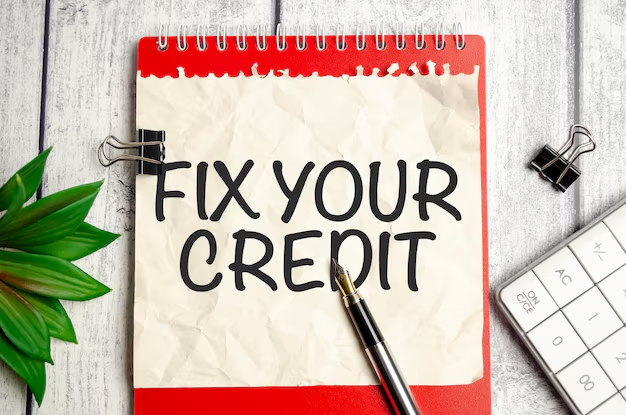Mastering Credit Repair: Your Step-by-Step Guide to Reviving Financial Health
Navigating the Path to Credit Repair
When it comes to financial stability, your credit score is more than just a number—it’s a powerful key that can unlock opportunities or slam doors shut on your financial ambitions. Understanding how to embark on the journey of credit repair is essential for anyone eager to enhance their financial profile. Whether you’re looking to purchase a home, secure a loan, or just improve your financial standing, learning how to repair your credit can be transformative.
Why Credit Repair Matters
Before diving into the intricacies of credit repair, it’s crucial to understand why it matters. A higher credit score can lead to lower interest rates on loans and credit cards, more favorable terms, and increased chances of approval. For many, the concept of credit repair can seem daunting, but breaking it down into actionable steps can simplify the process.
Understanding Your Credit Report
The Initial Step: Securing a copy of your credit report is the first step in the repair process. This report is a comprehensive record of your credit history, including your borrowing habits and payment records. By federal law, you are entitled to a free annual credit report from the major credit bureaus. Examining this report closely will help you identify errors or areas of concern that need addressing.
Key Elements of a Credit Report:
- Personal Information: Make sure your personal details are accurate.
- Credit Accounts: Review all listed accounts to ensure they reflect your payment history correctly.
- Inquiries and Collections: Note any inquiries that may affect your score and review collection accounts for accuracy.
Identifying and Disputing Errors
Errors on your credit report can unjustly lower your credit score. Common mistakes include incorrect personal information, accounts that aren’t yours, and misreported late payments. Successfully disputing these inaccuracies can lead to score improvements.
Steps for Dispute:
- Document Evidence: Gather documentation that disproves the error.
- Contact Credit Bureaus: Write a clear letter or use online systems to submit disputes—include copies of supporting documents.
- Follow Up: Bureaus typically investigate within 30 days, but it’s crucial to monitor the process and follow up as needed.
Establishing Positive Credit Practices
Once errors are addressed, focus on adopting practices that boost your creditworthiness. Building positive credit habits not only improves your score but also ensures it stays healthy.
Tips for Building Positive Credit:
- Timely Payments: Always pay bills on time—set reminders or automate payments.
- Credit Utilization: Aim to use no more than 30% of your credit limit.
- Diverse Credit Mix: A healthy mix of credit accounts, such as revolving credit (credit cards) and installment loans, can enhance your score.
Balancing Debt and Credit Utilization
High levels of debt can lead to poor credit scores. Managing this effectively is crucial to repair and boost your credit.
Strategies for Debt Management:
- Create a Budget: Analyze your income versus expenses and set realistic debt repayment goals.
- Debt Snowball Method: Focus on paying off the smallest debts first while making minimum payments on the others, then move to the next smallest, and so on.
- Negotiate: Communicate with creditors to negotiate lower interest rates or manageable payment plans.
Seeking Professional Assistance
For those who find the credit repair process overwhelming or need expert guidance, professional credit repair companies can offer assistance. However, it’s vital to choose a legitimate organization to avoid scams.
Evaluating Credit Repair Companies:
- Reputation Check: Look for reviews and check any complaints lodged against them.
- Transparent Fees: Understand pricing structures upfront to avoid unexpected costs.
- No False Promises: Be wary of companies that promise drastic score improvements instantly.
Continuous Credit Monitoring
Once you have repaired your credit, continuous monitoring ensures it remains in good standing. Consider setting up credit monitoring services that alert you to changes in your credit report.
Benefits of Credit Monitoring:
- Proactive alerts regarding changes in your report allow for swift action.
- Helps in detecting potential identity theft early on.
- Provides regular updates on your credit score progress.
A Quick Recap: Key Takeaways and Action Steps
To weave the threads of this guide into a seamless fabric of credit repair understanding, here is a summary of crucial tips and next steps:
- 📊 Review Regularly: Obtain your credit report annually and check for errors.
- ✍️ Dispute Diligently: Rectify inaccuracies by disputing them promptly with evidence.
- 💳 Responsible Usage: Maintain low credit utilization and diversify your credit portfolio.
- 💡 Professional Advice: Seek help if needed, but choose reputable credit repair services.
- 📈 Progress Tracking: Consistently monitor your credit to maintain improvements.
The Road Ahead
Armed with the right tools and information, anyone can embark on the journey to repair their credit effectively. This process demands patience, diligence, and consistency, but the outcome—a solid credit profile—is worth the effort. By following these actionable steps and maintaining positive financial habits, you can navigate the financial landscape with confidence and pave the way toward a more secure financial future.

Related Topics
- A.i Credit Repair
- Are Credit Repair Companies Legit
- Are Credit Repair Companies Legitimate
- Are Credit Repair Companies Worth It
- Can You Repair a Credit Card Tha's Coming Apart
- Do Credit Repair Agencies Work
- Do Credit Repair Companies Work
- Do Credit Repair Services Really Work
- Do Credit Repair Services Work
- Do It Yourself Credit Repair
